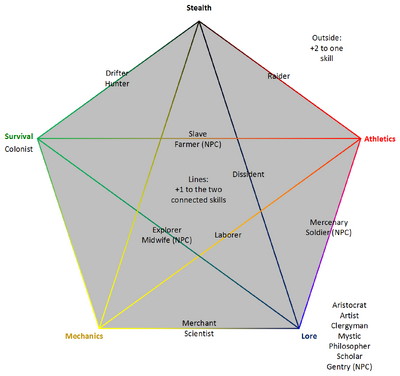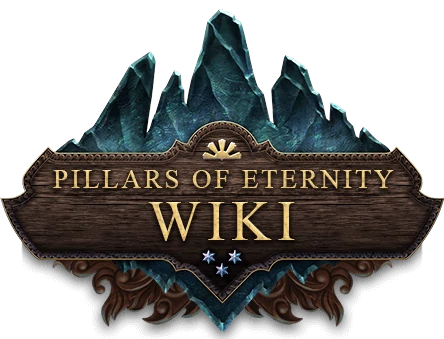Skills can be used outside of combat for a variety of purposes and they grant auxiliary combat bonuses. The five skills are Stealth, Athletics, Lore, Mechanics and Survival. Every class gains initial proficiency bonus in two skills, but not limited to them. Non-combat skills are gained separately from combat skills(Abilities, Talents) and they do not use the same resources.
Overview
| Skill | Meaning (based on the in-game description) |
Effects on gameplay | Use in interactions (based on the in-game description) |
|---|---|---|---|
| Stealth | allows characters of any class to attempt to avoid being seen or heard | can get closer to NPCs in scouting mode without being seen | ? |
| Athletics | counters the effects of accrued fatigue, allowing characters to go farther and fight longer before they suffer penalties |
at rank 1: -40% combat fatigue gain |
for physical feats like climbing, swimming, and jumping |
| Lore | a character's accumulated miscellaneous knowledge and trivia, often of occult or esoteric topics |
at rank 1: can use level 1 scrolls |
for picking up on relevant historical or cultural contexts, and contributing general knowledge |
| Mechanics | makes it easier to open locks and find and disable traps, and place traps of your own |
per rank:
can disarm traps of +1 difficulty |
for activating or disabling a variety of machines |
| Survival | allows characters to make better use of the food and potion items they find | per rank: +5% duration for consumables | for wilderness challenges, and for contributing specialized knowledge of nature or alchemy |
Effects
Reason: "This section sounds too vague and confused, and I'm pretty sure that only the protagonist's skills are checked in the released game. Needs research and rewriting."
Skills affect character stats, interaction with items and new dialogue options, and can be used to avoided fighting. There will often be ways to avoid fighting. Examples: standard methods of talking your way out of a fight or sneaking around an encounter, but there will be other ways too. Perhaps you can re-sanctify a desecrated cemetery to prevent any further undead from rising, or maybe figuring out a way across a ruined bridge will always avoid the bandits on this side of the river.
During any situation where a skill is checked against a challenge’s level of difficulty, the party member with the highest relevant skill is represented as the starting benchmark. If their skill outweighs the difficulty score, the player’s efforts succeed.[1]
Some items are used in different scenarios to alter how skill checks occur. These items are categorized as ingredients and helpers. Ingredients are used for recipes, and are typically consumed in the process. Helpers come into play during scripted interactions, where the presence of an item during a scenario (e.g. having rope at a ledge) can shift the trajectory of the narrative.[1] Verify
Allocation
At first level, a character only has their initial class and background bonuses to skills. Each class confers bonuses in two or three skills and each background in one or two skills.
Upon achieving a new level, a character gains 6 skill points. Advancing a skill to the next rank costs one point, plus one point per time the skill has already been advanced. Note that class, background, and other bonuses are "free" and do not increase the cost of advancing skills.
Class bonuses
| Class | Stealth | Athletics | Lore | Mechanics | Survival |
|---|---|---|---|---|---|
| Barbarian | |||||
| Chanter | |||||
| Cipher | |||||
| Druid | |||||
| Fighter | |||||
| Monk | |||||
| Paladin | |||||
| Priest | |||||
| Ranger | |||||
| Rogue | |||||
| Wizard |
Background bonuses

| Background | Stealth | Athletics | Lore | Mechanics | Survival |
|---|---|---|---|---|---|
| Aristocrat | |||||
| Artist | |||||
| Clergyman | |||||
| Colonist | |||||
| Dissident | |||||
| Drifter | |||||
| Explorer | |||||
| Hunter | |||||
| Laborer | |||||
| Mercenary | |||||
| Merchant | |||||
| Mystic | |||||
| Philosopher | |||||
| Raider | |||||
| Scholar | |||||
| Scientist | |||||
| Slave | |||||
| Farmer (NPC only) | |||||
| Gentry (NPC only) | |||||
| Midwife (NPC only) | |||||
| Soldier (NPC only) | |||||
| Trapper (NPC only) |
Buffs
Rites are a special, non-craftable type of scrolls that temporarily boost specific skills.
Certain wearable and consumable items can additionally provide temporarily bonuses to skills (see Attribute and skill boosts).
